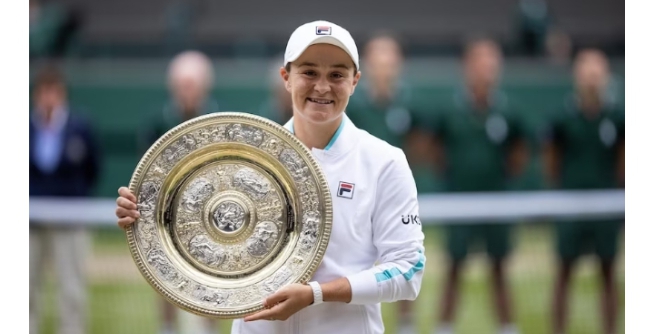Ash Barty, Magnolia Maymuru and Aunty Marjorie on breaking barriers this International Women’s Day.
Former world tennis champion Ash Barty is no stranger to pressure.
Watching her victorious Wimbledon match from 2021, you can hear it building in the crowd every time her opponent Karolina Pliskova missed the ball.
At just 25 years old, Barty was carrying the weight of the country on her shoulders.
And while that would be anxiety-inducing for many, Barty had a secret weapon she used in times like these — her positive mindset.
“I had so much genuine interest and investment and people wanting me to do well, and I think sometimes that can be perceived as pressure,” she told the ABC’s Indigenous Affairs Team.
“But I learned to really embrace it and understand it’s coming from a good place.”
The freedom that came from that new mindset helped her play some of her best tennis, she said.
After a three-set thriller, she became the first Australian ladies’ Wimbledon champion in 41 years.
Drawing strength from tough times
Barty has overcome many challenges to get to the top — from her body image battles as a teenager to the burnout that led to her 15-month tennis hiatus in 2014 — so how does she deal with setbacks?
“It’s important to lean into the emotions you’re feeling, whether it’s sadness or anger; that’s part of being a human being,” the Ngarigo woman said.
“When I was going back through some of those moments, I really try and see the opportunity for growth, for learning and what I could’ve done better.
“Understanding through your darkest times is your opportunity for your biggest growth.”
The three-time Grand Slam singles champion is now notching up another ‘first’ with the launch of Mattel’s first Aboriginal Barbie doll.
Barty and her friend, fellow Indigenous global tennis star Evonne Goolagong Cawley, recently launched the dolls, which are part of a special collection.
“When we saw the dolls for the first time, it was pretty surreal,” she said.
“To be able to do it with Evonne, someone who’s been an idol of mine, a friend, a mentor, it was really neat.”
For Barty and Goolagong Cawley, the one-of-a-kind Barbie ‘Role Model’ dolls are also about empowering the next generation through representation.
“I’ve always been a big believer, if you can see it, you can believe it,” Barty said.
“It’s obviously special to be the first Indigenous release for Barbie but I think it spreads wider.
“It’s creating this endless possibility of what girls can be, what they can dream of, and what they can achieve,” she said.
